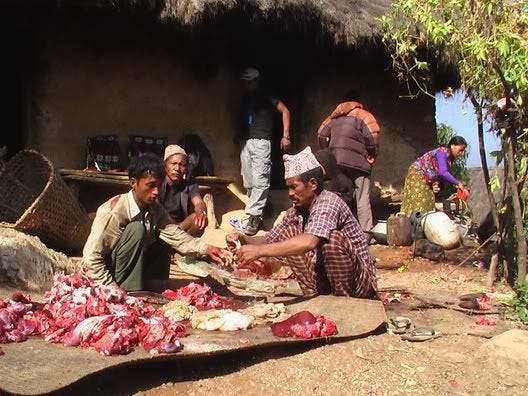Trekking to the Maoists

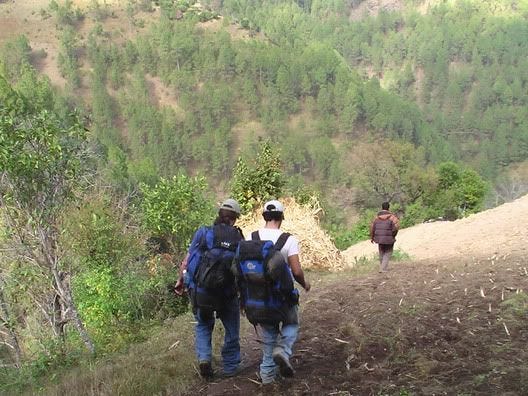
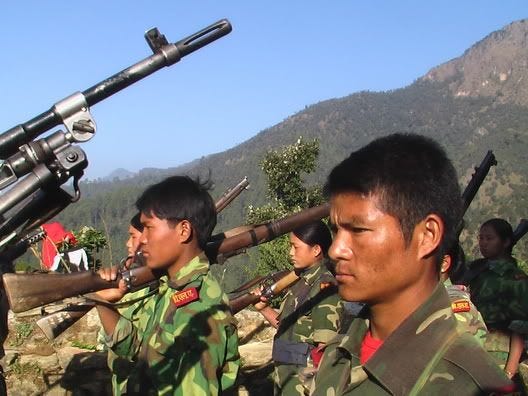
I am writing this in my notebook from the Nepali village of Thawang. There are no computers here, nor are there toilets, trash cans, or electricity. All that exists here are 200 stone and clay huts tucked inside a Himalayan valley. There are no roads into this place. We had to trek for four days to get here and we'll trek another four to get back. But now that I am here in this remote village it is worth all the effort. Being here is almost as fascinating for me as it is for the locals. For many of them, I am the only Westerner they've ever seen. One woman dropped a basket of leaves she was carrying when she saw me. Everyone stares at me constantly. As I write this from a sunny ledge opposite an impromptu gathering of villagers, I look up from my notepad abruptly only to find that the conversation has stopped and they're all staring at me. As soon as our eyes meet, they quickly turn away and reinitiate conversation. The children are less discreet, staring at me without shame. The fascination is mutual. While they see me as sort of an alien, with a mix of trepidation and bewilderment, I am the privileged Westerner who has seen villages similar to this one in other parts of the world. I have also seen larger villages like New York City, Malibu, and their capital city Katmandu, 3 markedly different places that these people will likely never see in their lifetime. How you interpret a certain reality is shaped by your experiences. I therefore see them as part of a whole, the whole being humanity. It’s difficult to put myself in their minds’ eyes, but I would conjecture they probably view me a distinct part, not necessarily connected to the whole, or possibly an entirely different “whole”. I enjoy not only the self-awareness I gain from being in such a foreign world, but also the self-awareness and introspection that my presence undoubtedly inculcates in them. A boy is staring over me as I write. I turn around and greet him with an embroidered smile, “Namaste”- I salute you. He giggles and runs away. I continue writing, and the boy returns. I say “Namaste” again and this time he is unafraid and he continues to observe me knowing that I am aware of him. I flash another smile and now we are friends. It is moments such as these that I truly savor.
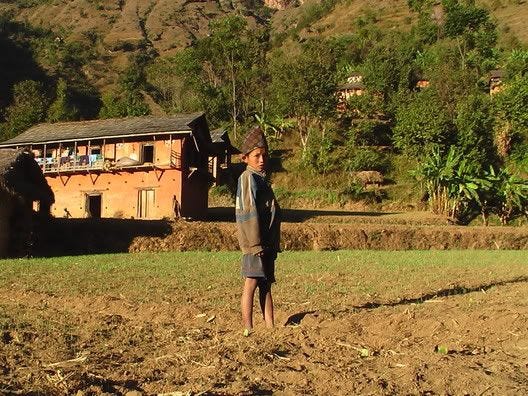
After spending two weeks in the backpacker haven of Thamel in Katmandu; eating pepper steaks, frequenting the local pub Tom and Jerry’s, and playing pick-up basketball with a local Nepali club team, we had finished editing our Tibet piece and we set off on our next adventure. This one promised to be more dangerous, more grueling, and laced with uncertainty; the combination of which had me pretty excited. The mission: find the Maoist rebels of Nepal and interview them. The problem: the Maoist strongholds are strategically located in the middle of nowhere. The plan: fly to Nepalganj, hire a fixer and a guide, and then go on a 10 day trek to Thawang, unofficial capital of the Maoists.
We got to Katmandu’s decrepit domestic terminal all prepared and ready to go, cameras, lightweight tripods, hiking boots, water purifier, the works. Psyched to embark on this adventure, I was pretty bummed out when we got to the airport and learned that our airline “Cosmic Air” hadn’t been paying their gas bill and their planes were grounded indefinitely. We rebooked for the next day on “Yeti Air” and were in Nepalganj the next evening. There we were to meet up with a man we had never met before, but who we knew was a man very familiar with the Maoists as a feature reporter for the Katmandu Post, a man named J. Pandey. We arrived at the Nepalganj landing strip and it was pitch black. There was one exposed light bulb in the one room airport, and there were no lights in the city. A man and a boy came over to greet us. I didn’t expect that these were the two I’d spend the next 10 days with.
Krishna and Pradeep were their names. Krishna is a reporter for a Nepali newspaper and Pradeep was J.Pandey’s 18 year old son, who I affectionately called, “The Young Cricketer.” They took us to a hotel that had no hot water, a hole for a toilet, and leeches the size of mice on the bathroom tile. But it was by far the nicest accommodation we would have for the next couple weeks. Krishna had already taken a New York Times reporter to Thawang, and seemed familiar with the terrain, so we figured we could trust him. The Young Cricketer came along as a translator/”little brother type that I could practice my karate on”. We hired them and took off early the next morning.
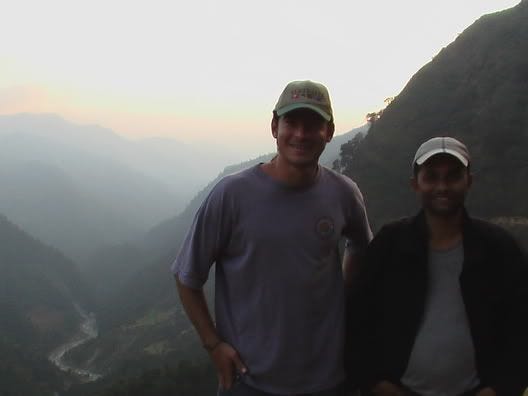
Me with Krishna

Me with Pradeep, Young Cricketer
Before we could leave Nepalganj we had to make what are known as visitor cards which we were to present to the Maoists. We had business cards but they wouldn't suffice, so Krishna took me on his motorcycle to make visitor cards. I wasn’t exactly sure what a visitor card entailed but he told me to put my name, my occupation, and where I’m from (“but do not put the United States”, he told me, “the Maoists don’t like the United States”) Fortunately for us, I was born in Canada and Adrian was born in Mexico, which we put on our respective visitor cards. No one ever asked the logical question as to why a Canadian and a Mexican are working together. Printed on normal printer paper, I had 60 visitor cards ready to disperse amongst the Maoists.
We didn’t anticipate how expensive it would be to hire a car to Tila, which was the last town a car could reach on the way to Thawang. We negotiated for over an hour in Nepalganj but nobody would do the day trip for less than 120 dollars. They said it was too risky; that the Maoists might tax them 100 dollars (this actually happens quite often in Maoist controlled areas where all civilians must give 10 percent of their salary to the cause or face the consequences). Also, the road to Tila, we learned later, was more like a hiking trail wide enough for a car and just about every vehicle that attempts this passage better have a spare tire. So we decided after an hour to take a public bus, or in this case a public van. There were 16 of us in a standard van but it wasn’t as uncomfortable as it seemed. We got to some tiny town halfway to Tila at around 5 o’clock. There the van stopped and we had already missed the last bus out of this one-yak town. We had no choice but to hire a car and once again there was a problem; now the excuse was a government imposed curfew that was set for 8 o’clock.
We finally convinced a driver to break the curfew and take us to Tila. Night fell about an hour into the drive and we were driving on the worst “road” I’ve ever seen. Suddenly the 4 wheel drive hit a snag in the road and we were launched into a creek. We got out of the car to find two wheels fully submerged in a foot of water. We worked for about two hours in the freezing cold, dragging rocks from the creek and essentially built a road underneath our tires. When the jeep made it out of the creek we were all ecstatic. This ecstasy lasted about a half hour, when the jeep’s accelerator broke. There were 7 of us in the jeep and we all had to sleep inside. After an hour of shivering with The Young Cricketer’s feet in my face, I decided to brave the elements ands sleep outside. I took my sleeping bag and looked for a flat place to put it. There was none. I eventually settled for a giant rut in the road next to where our jeep was stuck. I was a foot away from the tire on one side and a 50 foot cliff on the other side. Needless to say it was a miserable night and I woke up before dawn freezing and jumped back into the jeep for some body warmth.
I have never been so happy to see the sun rise, which meant my boots would dry out and I would warm up. Our jeep would be stuck for a while, so we paid our driver half the money and waited for a public bus that, to my amazement, traveled this god forsaken road every morning. It finally arrived, but was completely full, so we rode it “Nepali style” which means, we held on for dear life while riding with the luggage on the roof. I wedged myself between some bags and was actually quite comfortable and secure. My legs dangled off the side of the bus as we careened up and down mountain passes for the next three hours. I was joined by some Maoist soldiers on the roof, who seemed too serious for their age. They were no more than 18. I felt a sense of relief that this Maoist army appeared about as innocuous as a boy-scout troop. This is not actually the case. The Maoists have terrorized government installations throughout Nepal since 1996. They don’t target innocent civilians or tourists, but anything with the Nepali Flag is fair game in their eyes. The Maoists are seeking to overthrow the ruling monarchy and install a Communist government in Nepal, one of the poorest countries in Asia. They have many followers in downtrodden, rural Nepal, and have even taken over whole villages, where they have instituted their own security forces, social system, and educational program. When we arrived in Maoist country in late November, 2005, there was a unilateral cease fire in effect so the troops were not going on missions, but instead were doing community work. One such project was building a proper road to Thawang, which would have made our trip much easier.
We arrived at Tila in the late afternoon’s shadowy light. We had a “dhal baht” which is basically a plate of white rice (baht) with a soupy lentil based liquid (dhal) poured over it. If you’re lucky, you get a vegetable as well, which comes in the form of spinach, broccoli, or potatoes. This time it was spinach. Damn. We got a room at the local “hotel” which was basically a dusty room with two beds and a light bulb. We put down our bags, had a chai tea, and waited for the local Maoist leader, a lieutenant, to come to our room. Ten minutes later, after I was already wearing my pajamas (a set of green long underwear two sizes too small) and in my sleeping bag, a contingent of 8 happy Maoists entered our room in plainclothes. It was really a ridiculous scene, me in my long underwear hopping out of my sleeping bag to greet these militia men. They asked for my visitor’s card, which they studied for way too long, and then finally the leader exclaimed, “Canada!” I said, “Yes, Canada.” He asked, “What is the system of government in Canada?” I said, “Parliamentary Democracy.” And then the questions went on, ranging from economics, politics, philosophy, and culture. Most of the questions were about Canada, a country I haven’t lived in since age 4, and I had to wing it. One man even asked me the national animal of Canada, to which I quickly responded, “The Snowy White Owl”, my former fraternity’s mascot. It was the best thing I could come up with. Finally after a four hour “feel-out” session, our itinerary was approved by the Maoist leader, a friendly, intelligent man, who extolled the virtues of Marxism with us for hours until I couldn’t keep my eyes open anymore. That night I dreamt of Lenin.

The crew with the Maoist lieutenant
The next morning, we were taken to an army camp where 25 young soldiers were waiting in formation with their weapons in hand. They did a few exercises for the camera. We interviewed the Maoist leader, bid farewell, and were on our way to Thawang, still a four day journey away. Except for the stunning, dramatic scenery, the trek was a monotonous daily routine that was repeated for four days. Wake up freezing at the crack of dawn, eat dhal baht and drink chai tea, walk for five hours, eat more dhal baht, walk for another five hours, eat dhal baht and go to sleep. Repeat. The only times things varied was when one day I couldn’t stand the filth any longer and I jumped into an ice cold mountain river. The water was so pure and had the turquoise color of a tropical sea. It was invigorating, and gave me energy for the hike.

The trail led us to this river which I had to ford with my pants off to stay dry as we hiked well into the night.

Taking a much needed break. I nicknamed Adrian "the squirrel" because he was constantly pulling out cashews and dried fruit from his pockets. We split a large packet of nuts and fruit and I finished my half the first day of the hike. He wisely stored the goods in various pockets of various articles of clothing and every once in a while I'd look over and see him chewing on something and I'd get pissed.
The trail varied in width and difficulty. Sometimes it was 5 feet wide and other times it was only 6 inches wide. One time just before nightfall, the trail completely ended. There was a passable, but nearly vertical rock face that required you to put one foot on the mountain while placing your hands into tiny holds on the rock. Below was a 60 foot steep drop into a ravine. Nervous as hell, I decided to go for it, but first I threw my backpack to the other side. Perhaps a blessing in disguise, the backpack was open, and three essential articles flew out into the ravine below, the flashlight, the map, and the water purifier. We were forced to hike down into the ravine and pick up the things, which cost us our last hour of daylight. It was always problematic entering into a village after nightfall. Many of these remote villages have been extorted by the Maoists, who come knocking on doors at night asking for money or food at gunpoint. So we would often arrive at the villages at night and find all the doors locked, eerily quiet, and with nowhere to hang up our boots and get a cup of chai. Krishna usually did all the convincing work. We would wait on a boulder, wiped out after a full day of hiking, and he would return to announce whether we have a room to sleep in or not. Sometimes we got lucky but other times we had to sleep outside. We always were served a steaming hot chai and a healthy portion of dhal baht, which I began to call baht dhal just to make it seem like I was eating something else. Sometimes they served us bootlegged wine, which is a criminal offense in Communist country. Krishna’s eyes would light up when he learned that a family had some in stock and he would whisper to us, “Tonight we drink homemade wine, but Maoists don’t know.” While the Maoists have an open contempt for alchohol, they smoke more hashish than Rastafarians. We encountered fields and fields of Cannabis plants, some that were 12 feet high. They use the hemp fibers for rope and wicker baskets, the oil for cooking, the seeds for food, and of course, the hashish for smoking.
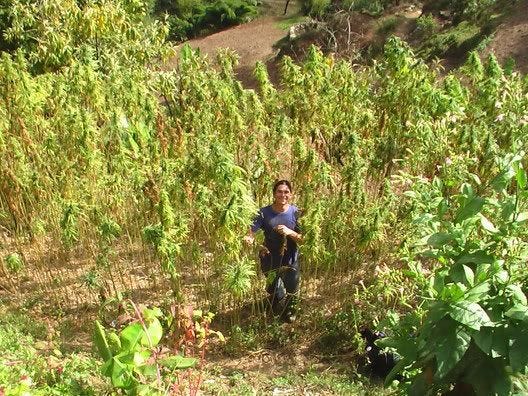

We arrived in Thawang to a hero’s reception. The town is perched in a stunning Himalayan valley, overlooking a line of snowcapped peaks that stretches as far as the eye can see. They greeted us with open arms and plenty of baht dhal. We interviewed them, ate with them, talked with them, and observed them. We visited a Maoist school, a Maoist communal farm, and heard their stories of kidnappings and murders by the royal Nepalese army. (According to human rights groups, Nepal is number one in the world for “disappearances.” Both the government and the Maoists are to blame. One Nepali journalist was actually kidnapped by both groups on two separate occasions because each one thought he was allied with the other). They were poor but proud. They were also incredibly aware of their poverty, which is uncommon, but necessary I suppose for any sort of proletarian Revolution to incur. They believe this Revolution will happen in Nepal and will then spread to other parts of the world and free oppressed people everywhere.


Many of the Maoist soldiers are young girls who are fed up with the Hindu social caste system in which they are at the bottom of the barrel. Maoism promises equality, so they shed their traditional nose rings in exchange for Kalishnikovs.



Thawang

A building in Thawang adorned with the visages of Marx, Engels, Lenin, Stalin, and Mao.


Interviewing the Maoist superintendent of schools
On our last night in Thawang, they put on a special Maoist cultural performance in our honor. People came from neighboring villages to watch the show, which featured Communist themed songs and dances. They played the “mahdal,” a two-headed cylindrical drum, with expertise. We sat backstage throughout the show, and suddenly they called us to the stage and introduced us as Jerry and Edwin from Mexico. They then gave us a “tikka”, which is an honorary gob of red powder on the forehead, which would give us luck on our journey back.

Giving us our second "tikka" just before we began our trek out of Thawang.
We trekked back in only 3 days, stopping only to eat and sleep. We needed to get back quickly because we were heading to Pakistan through India and we only had 4 days left on our Indian transit visa. Luckily we found a border that was a complete mess. The Nepalese didn’t even check us on the way back and the Indians had no idea how to process us. They stamped my passport on the observation page and let us through without a search. We bid farewell to Krishna and Pradeep and were on our way to New Dehli en route to Pakistan.





